Packing
Lesson-7
Packing
By Jerome K Jerome (an extract from Three Men in a Boat)
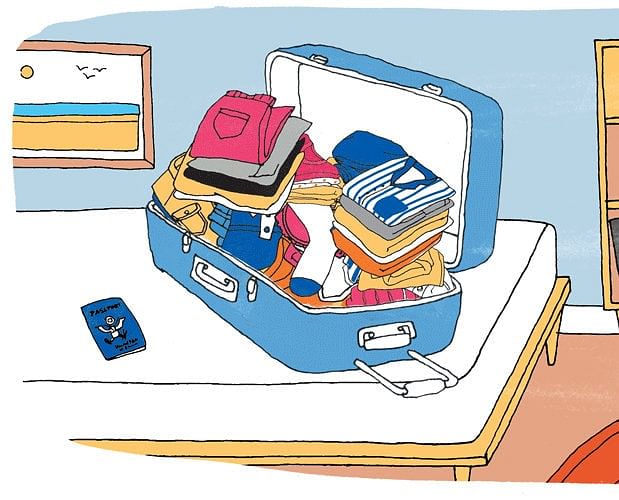
Packing Introduction
The 'Packing' lesson is an extract from Jerome K. Jerome's novel Three Men in a Boat. It humorously describes an incident that occurs when the narrator and his two friends are packing their belongings before going on a boating trip. It emphasises the fact that packing is an art form that only a few people are gifted with.
Packing Summary
Jerome, the story's narrator, was proud of his packing abilities. He had planned a trip with his friends George and Harris. He instructed them to leave the packing to him, to which they readily agreed. Harris cocked his legs on the table and watched Jerome pack while George sat in the easy chair. But this was not what Jerome had in mind. When he said he wanted to do all of the packing himself, he meant he wanted to be in charge of everything and direct his friends to work efficiently under his supervision.
He was angry at them for simply standing around and watching him work. It was unsettling for Jerome to sit idle and watch another person work alone. His vivacious personality compelled him to get up and supervise. When Jerome was packing the bag, Harris noticed that he had forgotten to pack the boots. So he had to open the bag again to pack his boots, and as he was about to close it, he wondered if he had packed his toothbrush. He had nightmares about forgetting to pack his toothbrush whenever he was about to travel. Then he'd wake up and go looking for it.
Then, in the morning, he would pack it before using it, only to have to unpack it again to get it and then repack, forgetting to put the toothbrush back in. Then he had to dash upstairs to fetch it. He always ends up with the toothbrush wrapped in a pocket handkerchief in his pocket. Jerome had to search the entire bag, as is customary. He found George's and Harris' toothbrushes eighteen times, but he couldn't find his own. He eventually found it inside a boot and had to repack.
When he was finished, George asked if the soap was in, but Jerome was so tired that he didn't seem to care. But when he re-strapped the bag, he realised he had packed his spectacles inside, and he had to open it again. Finally, at 10:05 p.m., he finished packing, and George and Harris decided to pack the food hampers. George and Harris began by demonstrating that they were better at packing than Jerome. Jerome was eager to see how things would turn out. They began by breaking a cup, just as he had expected.
Harris then accidentally squashed a tomato by putting strawberry jam on top of it, and he had to pick the tomato out with a teaspoon. In addition, George stepped on the butter. It was now Jerome's turn to sit back and observe them, which irritated them. They stepped on things, threw things behind them, and then couldn't find them when they needed them. They placed the pie at the bottom and piled heavy objects on top of it, which ruined the pies. They poured salt all over the place and worked their magic with the butter.
The butter got stuck to George's slippers. They tried to put it in the kettle after he took it off his slippers, but it wouldn't fit. They placed it on a chair, but Harris sat on it, and the butter stuck to his back. They then went in search of it. After much searching, George discovered that it had been at the back of Harris the entire time, and they finally packed it in the teapot. Then their pet dog, Montmorency, appeared, only to add to the confusion. Montmorency was a mischievous dog whose sole purpose in life was to cause problems and be scolded. Only when he was screamed at did he feel like his day had not been wasted.
So, just as things were about to be packed, he entered the room and sat on them. Montmorency made it a point to reach for his nose whenever Harris or George extended their hand for anything. He got his foot caught in the muck, disorganised the teaspoons, and hampered the lemons. After numerous obstacles and tremendous efforts, the packing was finally completed at 12:50, and Harris sat on the hamper, hoping that nothing was broken. George consoled himself and Harris by saying that if anything was discovered broken, it was because it had already been broken.
They were all tired and decided to get up at half past six a.m. George had already fallen asleep at that point. So George and Jerome put the bath in a place where he could fall into it when he woke up in the morning and went to bed themselves.
Packing Lesson Explanation
I SAID I’d pack.
The writer Jerome liked to pack luggage for trips and announced that he would do the packing.
I rather pride myself on my packing. Packing is one of those many things that I feel I know more about than any other person living. (It surprises me myself, sometimes, how many such things there are.) I impressed the fact upon George and Harris and told them that they had better leave the whole matter entirely to me. They fell into the suggestion with a readiness that had something uncanny about it. George spread himself over the easy-chair, and Harris cocked his legs on the table.
- pride myself on: am proud of
- fell into: here, accepted
- Uncanny: strange, weird
- cocked his legs: bent the legs on the knee as he sat
Jerome believed that his ability to pack luggage was superior to that of others. He requested that his friends George and Harris leave the packing to him. Surprisingly, his offer was accepted immediately by his two friends. George sat comfortably on the easy chair, while Harris sat on the sofa with his knees bent and his feet on the table.
This was hardly what I intended. What I had meant, of course, was that I should boss the job, and that Harris and George should potter about under my directions, I pushing them aside every now and then with, “Oh, you!” “Here, let me do it.” “There you are, simple enough!” — really teaching them, as you might say. Their taking it in the way they did irritate me. There is nothing that irritates me more than seeing other people sitting about doing nothing when I’m working.
- Intended: planned, meant
- potter about: do some unimportant things
When he said he'd pack, he didn't mean that his friends would sit back and relax while he did all the work. He had meant that he would be the boss while they did all the chores. He'd nag and curse them for not knowing the job well enough, and then he'd pitch in to clean up the mess they'd made. He was irritated to see them sitting while he worked.
I lived with a man once who used to make me mad that way. He would loll on the sofa and watch me doing things by the hour together. He said it did him real good to look on at me, messing about.
Now, I’m not like that. I can’t sit still and see another man slaving and working. I want to get up and superintend, and walk around with my hands in my pockets, and tell him what to do. It is my energetic nature. I can’t help it.
- loll on the sofa: to recline or lean in a relaxed manner
- messing about: to waste time doing something without a particular purpose
- sit still: sit without doing anything
- Superintend: supervise, manage
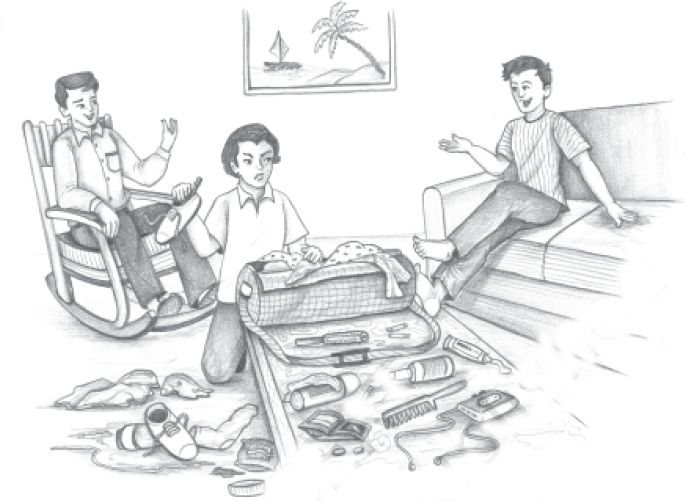
He recollects living with a man who would sit on the sofa all day and watch the writer do all the work. The man would say he liked watching him go around doing all the work. The writer would be enraged by this. The author goes on to say that he couldn't sit back and watch others work like slaves. On the other hand, he enjoyed inspecting their work, walking around with his hands in his pockets, and instructing them on how to do it correctly. He believes that because he was energetic, it was in his nature to act in that manner.
However, I did not say anything but started packing. It seemed a longer job than I had thought it was going to be; but I got the bag finished at last, and I sat on it and strapped it.
“Ain’t you going to put the boots in?” said Harris. And I looked round, and found I had forgotten them. That’s just like Harris. He couldn’t have said a word until I’d got the bag shut and strapped, of course. And George laughed — one of those irritating, senseless laughs of his. They do make me so wild.
- strapped it: closed it
- Wild: mad with anger
The writer said nothing to his friends and began packing. Harris said as he closed it that he had forgotten to pack the boots. Harris, the writer felt, could have reminded him before he closed the bag, but Harris, he thought, was like that! This was followed by George's irritating laughter, which enraged Jerome.
I opened the bag and packed the boots in; and then, just as I was going to close it, a horrible idea occurred to me. Had I packed my toothbrush? I don’t know how it is, but I never do know whether I’ve packed my toothbrush.
Jerome opened the bag in order to keep the boots inside. As he was about to close it, he had a strange thought about whether or not he had kept the toothbrush. He says that he never remembers whether or not he packed the toothbrush.
My toothbrush is a thing that haunts me when I’m traveling and makes my life a misery. I dream that I haven’t packed it, and wake up in a cold perspiration, and get out of bed and hunt for it.
And, in the morning, I pack it before I have used it, and have to unpack again to get it, and it is always the last thing I turn out of the bag; and then I repack and forget it, and have to rush upstairs for it at the last moment and carry it to the railway station, wrapped up in my pocket-handkerchief.
- Haunts: to repeatedly give trouble
- Misery: sad
- cold perspiration: sweat
- Hunt: search
Jerome adds that he always forgets to bring his toothbrush when he travels. He has nightmares about not packing it, wakes up sweating, and searches for it. He packs it before using it in the morning, then unpacks the bag to get the brush and uses it. He forgets to pack it again because it is the last thing that comes out of the bag and he has already repacked it. He rushes to his room at the last minute to retrieve the brush, which he finally wraps in his handkerchief and carries to the railway station in his hand.
Of course I had to turn every mortal thing out now, and, of course, I could not find it. I rummaged the things up into much the same state that they must have been before the world was created, and when chaos reigned. Of course, I found George’s and Harris’s eighteen times over, but I couldn’t find my own. I put the things back one by one, and held everything up and shook it. Then I found it inside a boot. I repacked once more.
- mortal thing: every ordinary thing
- Rummaged: searched in a hurried or careless way
- Chaos: confusion
- Reigned: ruled
Jerome had to take everything out of his bag while looking for his toothbrush, but he couldn't find it. He made a complete mess. He found his friend's brushes several times, but he couldn't find his own. He put everything back into the bag one by one, shaking each item as he went, until he found the brush inside a boot. He then repacked the bag once more.
When I had finished, George asked if the soap was in. I said I didn’t care whether the soap was in or whether it wasn’t; and I slammed the bag shut and strapped it, and found that I had packed my spectacles in it, and had to re-open it.
It got shut up finally at 10.05 p.m., and then there remained the hampers to do. Harris said that we should be wanting to start in less than twelve hours’ time and thought that he and George had better do the rest; and I agreed and sat down, and they had a go.
- didn’t care a hang: show no concern or interest
- Slammed: shut the lid forcefully and loudly
- Hampers: baskets used to carry food, utensils, etc.
When Jerome closed the bag, George inquired if the soap was still inside. Jerome was impatient, so he said he didn't care if it was there or not, closed the lid, and strapped the bag. Then he realised he'd packed his spectacles in it as well, and he had to open it again to get them. Finally, at 10:05 p.m., the bag was closed. They had to then pack the food baskets. Harris advised that because they had less than twelve hours to leave, they should also pack the baskets. Harris decided that he and George would pack the food baskets. Jerome agreed to take a break while his friends packed the baskets.
They began in a light-hearted spirit, evidently intending to show me how to do it. I made no comment; I only waited. With the exception of George, Harris is the worst packer in this world; and I looked at the piles of plates and cups, and kettles, and bottles, and jars, and pies, and stoves, and cakes, and tomatoes, etc., and felt that the thing would soon become exciting.
- light-hearted spirit: to be cheerful
- Evidently: clearly, obviously
- Exception: a person or thing that does not follow the general rule
In a good mood, George and Harris began packing the hampers. They wanted to demonstrate to Jerome that they could pack well. Jerome waited for them to make a mess because he thought Harris was the worst packer in the world. Jerome examined the piles of plates, cups, kettles, and bottles, as well as the jars, pies, cakes, and tomatoes that needed to be packed into the hampers. He reasoned that as the boys messed up, it would be entertaining to watch.
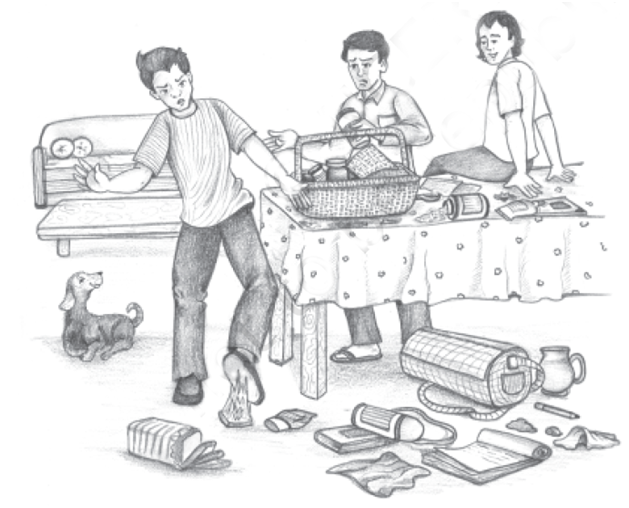
It did. They started with breaking a cup. That was the first thing they did. They did that just to show you what they could do, and to get you interested.
The scene became more interesting when they broke a cup at the beginning. According to Jerome, they broke the cup to demonstrate that they, too, could do so and to make things interesting.
Then Harris packed the strawberry jam on top of a tomato and squashed it, and they had to pick out the tomato with a teaspoon.
- Squashed: crush or squeeze something with force so that it becomes flat, soft, or out of shape
Harris topped the tomatoes with a jar of strawberry jam. The tomatoes were squeezed by the jar, and the damaged tomato was removed with a spoon.
And then it was George’s turn, and he trod on the butter. I didn’t say anything, but I came over and sat on the edge of the table and watched them. It irritated them more than anything I could have said. I felt that. It made them nervous and excited, and they stepped on things, and put things behind them, and then couldn’t find them when they wanted them; and they packed the pies at the bottom, and put heavy things on top, and smashed the pies in.
George then stepped on the butter. Jerome remained silent but sat on the table's edge to observe the action. His friends were irritated by his silence. They became nervous and stepped on the items. They hid the items, and when they needed them later, they couldn't find them. They put the pies on the bottom and piled heavier objects on top of them, smashing the pies.
They upset salt over everything, and as for the butter! I never saw two men do more with one-and two pence worth of butter in my whole life than they did. After George had got it off his slipper, they tried to put it in the kettle. It wouldn’t go in, and what was in wouldn’t come out. They did scrape it out at last, and put it down on a chair, and Harris sat on it, and it stuck to him, and they went looking for it all over the room.
- Upset: overturned
- Scrape: drag or pull
The boys dumped the salt can on everything. Jerome says that the small piece of butter caused a lot of confusion. He had never seen anyone make such a mess with butter worth one and two pence (meaning a very small piece) as they did. George took it out of his slipper and attempted to put it in the kettle. He couldn't do it, so he propped it up on a chair. Harris sat on it, the butter stuck to him, he stood up, and both boys searched the room for the piece of butter.
“I’ll take my oath I put it down on that chair,” said George, staring at the empty seat. “I saw you do it myself, not a minute ago,” said Harris.
- Oath: to swear upon something
George focused his attention on the empty seat where he had placed the butter a few minutes before. He swore an oath of truthfulness that he had placed there only a minute before.
Then they started round the room again looking for it; and then they met again in the centre and stared at one another.
They searched the room once more. They met in the centre of the room, both empty-handed.
“Most extraordinary thing I ever heard of,” said George.
“So mysterious!” said Harris.
Then George got round at the back of Harris and saw it.
“Why, here it is all the time,” he exclaimed, indignantly.
- Indignantly: in a manner indicating anger or annoyance at something perceived as unfair
The disappearance of the butter, according to George, was the most incredible thing he had ever witnessed. The disappearance of the butter, according to Harris, was a mystery. George noticed the butter stuck to Harris's back and stated that it had been there all along.
“Where?” cried Harris, spinning round.
“Stand still, can’t you!” roared George, flying after him.
And they got it off, and packed it in the teapot.
Harris turned around and asked as to its spot. George flew to Harris's back and asked him to stop. They took out the butter and stuffed it inside the teapot.
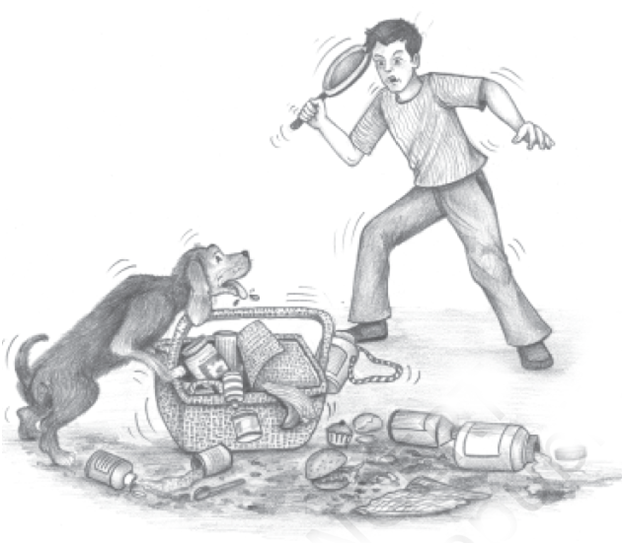
Montmorency was in it all, of course. Montmorency’s ambition in life is to get in the way and be sworn at. If he can squirm in anywhere where he particularly is not wanted, and be a perfect nuisance, and make people mad, and have things thrown at his head, then he feels his day has not been wasted.
- sworn at: get scolded
- Squirm: to wriggle or twist one’s body
- Nuisance: to cause inconvenience or annoyance
Montmorency, Jerome's pet dog, was present throughout. His goal was to interrupt everyone and then be scolded for it. Jerome continues, "If Montmorency was able to twist into a place and cause a nuisance by angering people and getting things thrown at him in return, he felt he had used the day well."
To get somebody to stumble over him, and curse him steadily for an hour, is his highest aim and object; and, when he has succeeded in accomplishing this, his conceit becomes quite unbearable.
- Stumble: to trip over a hurdle
- Curse: scold
- Conceit: here, his pride in himself
Montmorency's goal was for people to trip him up and scold him. By doing so, he felt he had accomplished his goal and would be proud of his accomplishment.
He came and sat down on things, just when they were wanted to be packed; and he laboured under the fixed belief that, whenever Harris or George reached out their hand for anything, it was his cold damp nose that they wanted. He put his leg into the jam, and he worried about the teaspoons, and he pretended that the lemons were rats, and got into the hamper and killed three of them before Harris could land him with the frying pan.
- Worried: disturbed
- Pretended: to behave as if something is true when you know that it is not
- land him: hit or punch someone
Montmorency sat on the things that needed to be packed. When George and Harris reached for the things to be packed, he assumed they were reaching for his cold, wet nose and would bring it forward for them. He stepped into the jam bottle, shook the teaspoons, pretended the lemons were rats, and then stepped into the hamper to kill these rats. Harris stopped him by hitting him with a frying pan.
Harris said I encouraged him. I didn’t encourage him. A dog like that doesn’t want any encouragement. It’s the natural, original sin that is born in him that makes him do things like that.
Harris blamed Jerome for encouraging Montmorency to cause all of this trouble. Jerome stated that a dog like Montmorency didn't require any encouragement. It was born to be and act in this manner.
The packing was done at 12.50; and Harris sat on the big hamper, and said he hoped nothing would be found broken. George said that if anything was broken it was broken, which reflection seemed to comfort him. He also said he was ready for bed. We were all ready for bed. Harris was to sleep with us that night, and we went upstairs.
- Reflection: thought
They had finished packing the hampers by 12:50. Harris sat on it, hoping that nothing would break in it. George was unconcerned, stating that it didn't matter if something broke. They went upstairs to sleep as they were getting ready for bed.
We tossed for beds, and Harris had to sleep with me. He said :
“Do you prefer the inside or the outside, J.?”
I said I generally preferred to sleep inside a bed.
Harris said it was odd.
George said:
“What time shall I wake you fellows?”
Harris said:
“Seven.”
I said:
“No — six,” because I wanted to write some letters.
- Tossed: throw something somewhere lightly or casually
As they settled into their beds, Harris inquired as to whether Jerome preferred the inside or outside of the bed. Jerome stated that he would rather sleep on the inside of the bed. This seemed odd to Harris. George asked them what time he should wake them up. Harris said seven, while Jerome said he needed to get up at six a.m. to write some letters.
Harris and I had a bit of a row over it, but at last split the difference, and said half-past six. “Wake us at 6.30, George,” we said.
- a bit of a row: an argument
- split the difference: this means that they agreed on 6.30 because it was halfway between six and seven
Harris and Jerome debated the time, finally settling on half past six, each accommodating his time by half an hour.
George made no answer, and we found, on going over, that he had been asleep for sometime; so we placed the bath where he could tumble into it on getting out in the morning, and went to bed ourselves.
- Tumble: to fall quickly and without control
George didn't respond because he was sleeping. Harris and George caused havoc by placing the bathtub next to George's bed so that when he awoke, he would fall into it, apparently so that he could take a bath as soon as he awoke.
About the Author
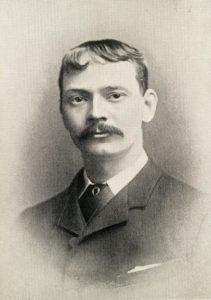
Klapka, Jerome Jerome was an English humourist and writer best known for his comic travelogue Three Men in a Boat. Other works include the essay collections Idle Thoughts of an Idle Fellow and Second Thoughts of an Idle Fellow, as well as the sequel to Three Men in a Boat, Three Men on the Bummel, and several other novels.

 ACERISE INDIA
ACERISE INDIA
